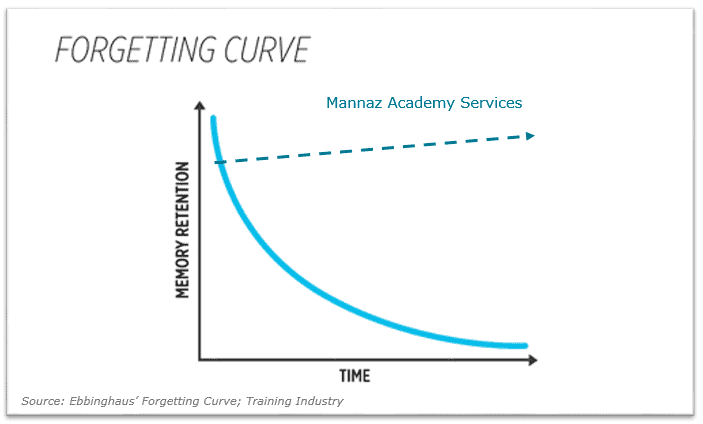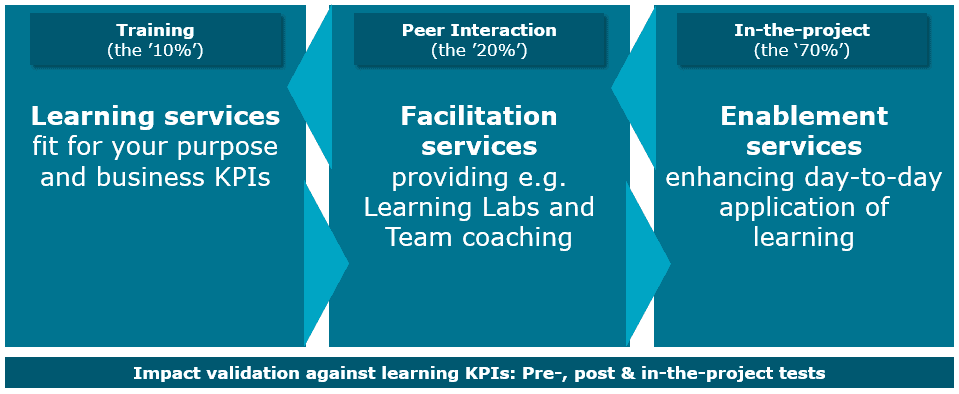10 October 2017

This article is based on a study conducted by EFMD, the Network of Corporate Academies (NOCA) and the Society for Human Resource Management, 2016. The results from this study were published in the article ‘Leadership Development: The Path to Greater Effectiveness’, Executive Summary. Findings and conclusions referred to in the following article belong to EFMD, the Network of Corporate Academies (NOCA) and the Society for Human Resource Management and are used to highlight recent trends within leadership development.
What if your company could significantly increase and sustain the impact of its learning?
… while achieving transparency in both cost & effect of the learning?
It is a well-known fact that over time we tend to forget information especially when there is no attempt to retain it. This is depicted in Ebbinghaus’ Forgetting Curve. The Forgetting Curve hypothesises the decline of memory retention over time. Retention of knowledge is key to increase the impact of development programmes and business results.
The study conducted by EFMD, NOCA and the Society for Human Resource Management (2016) found that organisations make considerable investments in developing their leaders with the intent of effectively improving the quality of leadership in organisations. However, on average, 34% of HR professionals, perceived their leadership development activity to be “a little effective” or “not at all effective”. Organisations are struggling to create effective customised learning programmes with high impact.
The following graph shows Ebbinghaus’ Forgetting Curve and how Mannaz Academy Services are ranked in comparison. It demonstrates the learning impact Mannaz development programmes deliver.
Investment in growing employees and leaders is crucial to developing the skills needed to effectively drive execution and manage change within organisations. For this investment to provide value for money, we must also consider what causes effectiveness in organisations’ development activities. The study argues that learning programmes must be designed to support the corporate strategy as well as create both organisational and individual impact to be effective.
One may think that organisations are focusing on improving their selection and collaboration with external suppliers in order to maximise their investment in effective learning programmes. But that is not the case. As few as 18% of HR professionals indicated their organisations were making these changes. The study found that this may point to a more transactional way of collaborating with suppliers by some organisations e.g., standard procurement processes focusing on selection of the suppliers rather than co-creating the solutions.
Trends within leadership development reveal that more and more organisations are customising their leadership development activities to go hand-in-hand with core organisational objectives instead of simply sending managers to participate in standard programmes. The study further concludes: “This customisation allows for focused development closely linked to the strategy and encourages strong engagement of both participants and stakeholders”.
Because of this trend and the fact that organisations are struggling to create effective customised learning programmes with high impact, Mannaz offers two customised approaches to increase documented impact of learning and business results. One is an end-to-end Learning Academy and the other a Leader Lab.
Mannaz end-to-end Learning Academies focus on increasing the competence level organisation-wide through increasing the learning impact on the individual. The academy is customised to solve generic corporate/organisational learning issues. Identifying generic organisational challenges, creates a baseline for increasing the impact of learning on the challenged area, e.g. Project & Programme execution skills.
The academy consists of a blended approach with both Learning Services and Enablement Services embedding the learning in-the-job, yet fully customised for the organisation.
Mannaz Leader Labs are customised learning services designed to solve specific, well-defined business issues. Specific business pain points are identified e.g. low agility, must-win-battle and/or people challenges. The purpose is to increase the performance level of the specific group of individuals working on the business issue as well as creating business KPI impact of the specific issue.
As with the Academy, the Leader Lab consists of a blended approach with both learning initiatives and enabled development embedding the learning on-the-job designed to solve the specific business issue.
Both the Mannaz end-to-end Academy and Leader Lab development approach is built to mitigate the fact that only 10% of people’s learning is derived from formal education, while 20% is achieved through interaction with others and as much as 70% comes from on-the-job use. Focusing on the relevance for the individual as well as the organisation, the academy approach maximises learning impact and effectiveness.

This approach allows for an agile learning setup which can be adjusted quickly depending on the organisational situation. Validation of impact against learning KPIs is measured before (Pre), right after training (Post) and four months after the programme has been completed (on-the-job).
Thus, customised Mannaz Academy and Leader Lab document learning impact, create higher efficiency and effectiveness in learning administration as well as enable faster and deeper execution of projects and programmes as a follow-on effect. This way organisations significantly increase and sustain the impact of learning, while achieving transparency in both the cost and effect of the learning.
The design and delivery of learning is typically highly inefficient according to the study. At Mannaz, we are proud to deliver customised and agile learning programmes that create learning impact way above benchmark norms.
The following graphs highlight the effect of Mannaz customised development programmes for 2014, 2015 and 2016. For all three years, the job score on learning outcome (4 months after the training) is higher than the post score (immediately after the training). This means, that learning continues and thus the forgetting curve is effectively broken. This represents a breakthrough in developing performance via an effective learning culture.

“We have never before seen that a learning provider, over three consecutive years, has been capable of maintaining a higher result in the ‘Job test’ than in the ‘Post test’. Most providers achieve this for only the first year, if at all. In fact, reaching 75% or above in the Job-test is exceptional in itself – our Peopleway benchmark for blended learning is 69,9% This is proof that Mannaz has found a solution to “make it stick” and crack the ‘forgetting curve’.”
Erik Nedergaard Hansen, Peopleway
Participants continue increasing their competence level on-the-job after completing a customised Mannaz development programme. Thus, the employees manage to retain the knowledge they have gained during the programme and over time the accumulated learning increases the general level of competence in the organisation. Mannaz Academy and Leader Lab are a strong example of how effectiveness of learning and development can be improved considerably.
This international study was a collaborative effort of EFMD, the Network of Corporate Academies (NOCA) and the Society for Humnan Resource Management (SHRM). It is based on responses from a total of 422 HR professionals from organisations headquartered in 25 countries with operations in 14 countries, on average. Participants responded to an online survey.